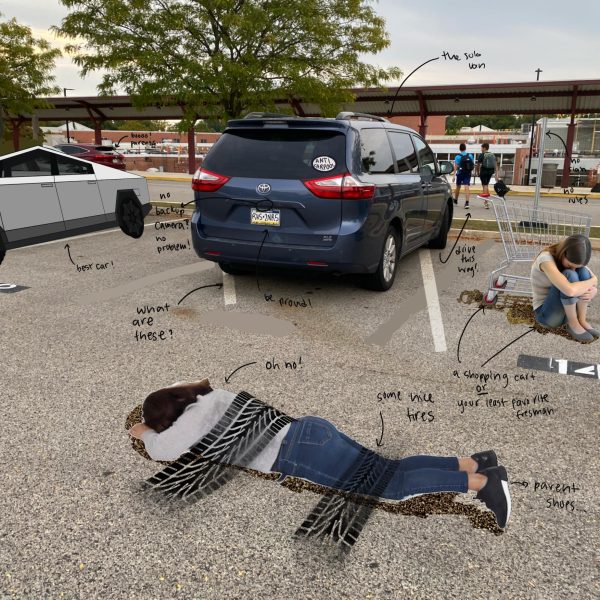ChatGPT: A Menace to Educators, or a Valuable Teaching Tool?

The dashboard of ChatGPT’s beta version, as ChatGPT answers question 3 of a past AP Language FRQ, as of January 2023.
March 15, 2023
Imagine a robot that can write an essay for you, or a computer program that can do all your shopping lists, plan your day, or an AI that you can chat with anytime, anywhere, like a human. Yet this technology already exists as ChatGPT. Since its release on November 30th of last year, it has triggered much discussion and panic over its effects on people’s daily lives.
ChatGPT is designed to have human-like conversations with its users, employing a technology called natural language processing (NLP) through which the AI attempts to understand a human’s input, employing its large datasets to generate clear, relevant responses to a human’s prompt. In addition, ChatGPT’s ability to carry conversations with its users creates a sense of humanness to its users, letting them easily understand its answers. The technology’s answers, however, are not always accurate, as ChatGPT sometimes got math questions wrong, wrote code with multitudes of errors, misattributed quotes, and came up with “disjointed nonsense.”
Despite these flaws, ChatGPT’s usage surged, garnering over one million users within its first week of launch and over fifty million in its first month. It now has a user base of over 100 million users, making it one of the fastest-growing consumer products released — so much so that it frequently complains about server overload during peak usage times, such as weekdays during business hours. A number of people are already concerned about how ChatGPT can upend their lives, including job displacement and loss of identity.
Educators especially worry about the potential for plagiarism that this tool creates. Its ability to write decent essays has triggered an uptick in cheating. A recent report from Study.com, for example, reveals that over a quarter of students were caught using ChatGPT to cheat, with some schools even compelled to ban its use because of that. An English teacher at Radnor details the widespread temptation to plagiarize with ChatGPT because of its accessibility: “while [ChatGPT] may not be better than what some students can produce, it is so easy and fast and free that even those students may be tempted to use it instead of spending the time to write on their own.” A number of educators express panic about this tool, with one teacher even comparing ChatGPT to the coronavirus in terms of its harmful impacts, such as widespread plagiarism and even outsourcing our thinking to it.
Students also share similar concerns about academic dishonesty, as a Radnor senior argues that “it’s a threat to academic integrity because people can use it to write essays for them and essentially hinders students’ ability to think for themselves.” Another senior comments how as ChatGPT improves, “the difference between genuine student thoughts and lifeless chatbot text may shrink,” making anti-plagiarism efforts more difficult and creating a greater incentive to cheat.
One senior at a different school even notes the dangers of ChatGPT writing about sensitive topics, as “[one] never really knows what old data is being inputted into the AI to produce new content.” After all, a lot of essay writing in English and social studies classes involve students forming opinions and writing and defending thesis statements, and knowing that ChatGPT can potentially provide questionable responses, like falsehoods and offensive remarks, concerns many users.
Yet the same abilities that tempt students into cheating can assist struggling students with essay writing, as the same English teacher mentions. A sophomore from another school, as well as a college undergraduate, said that ChatGPT can be used to provide different angles on a topic and offer writing suggestions and evidence to students for their writing. In fact, a school district in Kentucky is actively using ChatGPT to supplement their school curricula, with one teacher utilizing this tool to challenge students to tell human and AI writing apart.
Radnor teachers also recognize the opportunities that ChatGPT presents, including the curriculum supplements of the aforementioned school district in Kentucky. The same English teacher described one usage of ChatGPT in his class: “Last month I ran a prompt through it and the bot came back with errors, so I turned its mistake into a question in my 9th grade midterm, asking the students to show how they knew better.” He also details how because ChatGPT has upended traditional schooling, it forces teachers to re-evaluate previous curricula, enabling them to create lesson plans that remain relevant. At the same time, however, they advise caution over ChatGPT’s use, as a social studies teacher remarks that “the danger is always that students will be tempted to pass off work done by ChatGPT as their own work.”
Despite ChatGPT’s ability to provide easily understandable answers to questions users have, most people still prefer Googling answers as opposed to asking ChatGPT all the time. They argue that Googling is much faster, and it is easier to tell whether a query is questionable on Google compared to ChatGPT, where identifying valid responses is more difficult because one cannot delineate where it sourced its answer. In addition, Googling is a profound source of learning, since one must sort through all of its queries and find the answers themselves compared to ChatGPT which hands it on a silver platter, as a Radnor junior points out. However, many of the same students interviewed are open to using it to answer more complicated questions, and its ability to refine its responses to accumulating queries and explain in layman’s terms should give it an edge over Google.
As ChatGPT evolves, it remains to be seen how it and similar chatbots will affect society as a whole, especially in education. Because of its high cheating potential, students and teachers “must be vigilant about appropriate times and places for using ChatGPT,” as a social studies teacher remarks. Yet when used properly, ChatGPT can be a valuable asset in classrooms, assisting students with essay writing, self-expression, and more.






